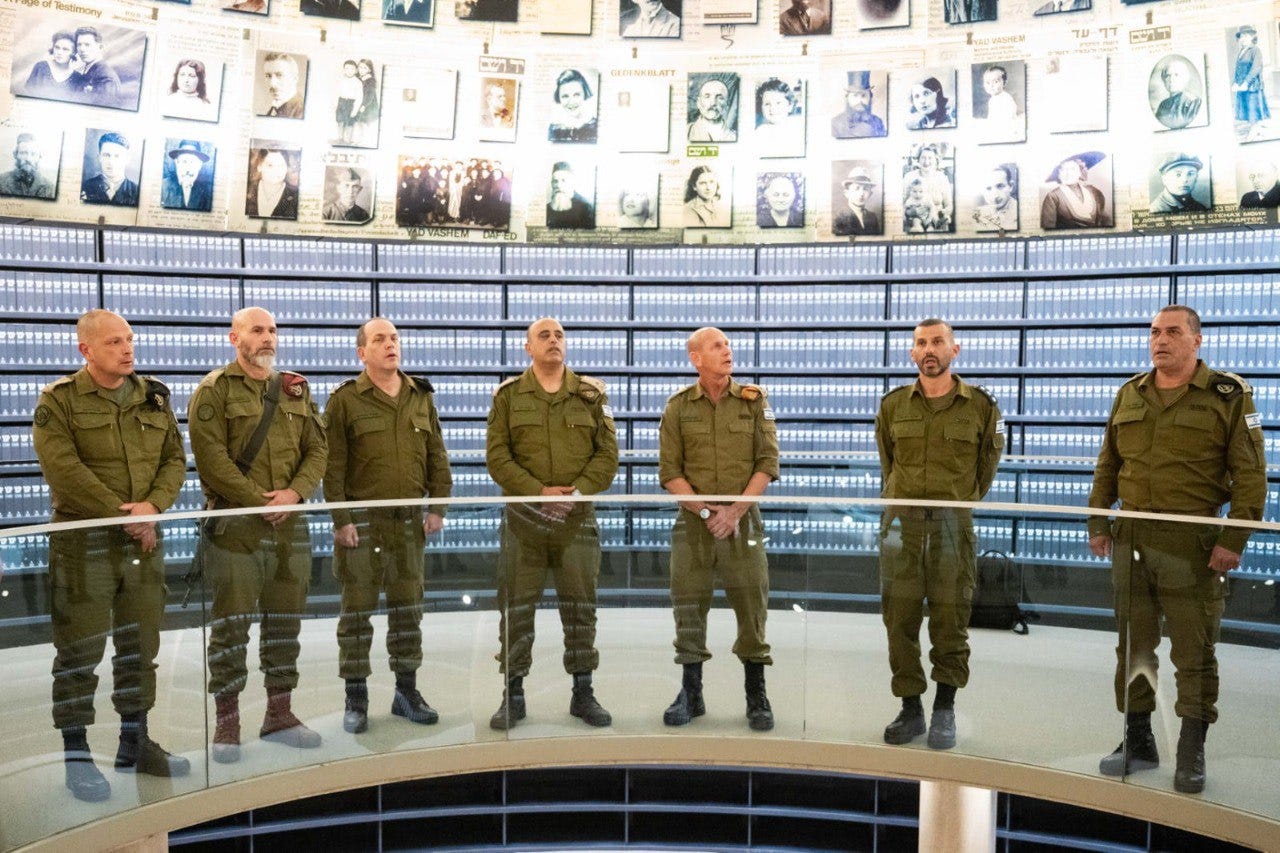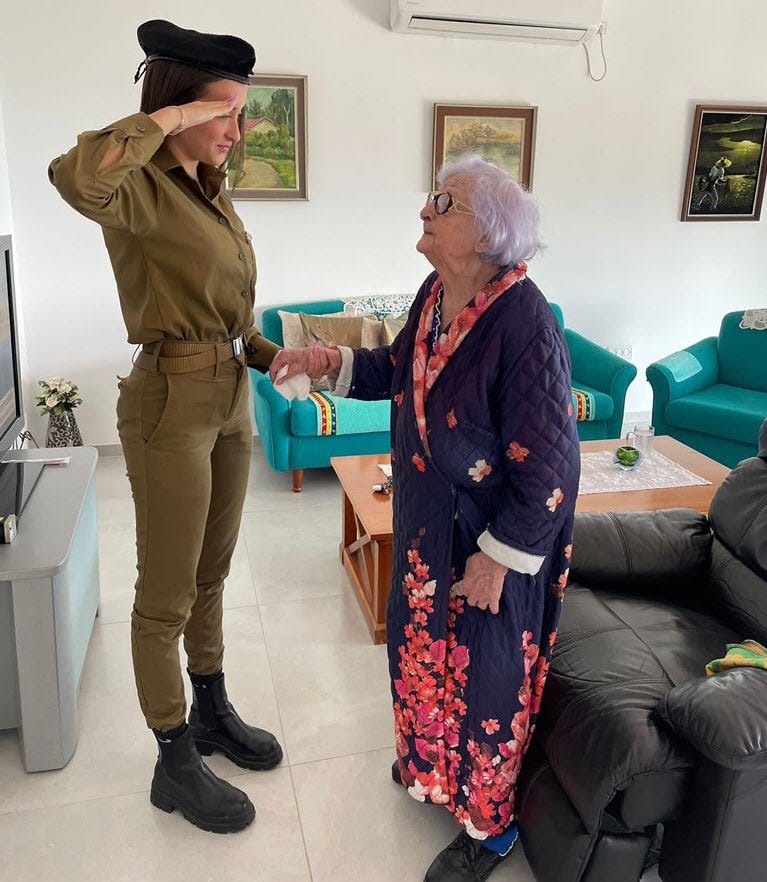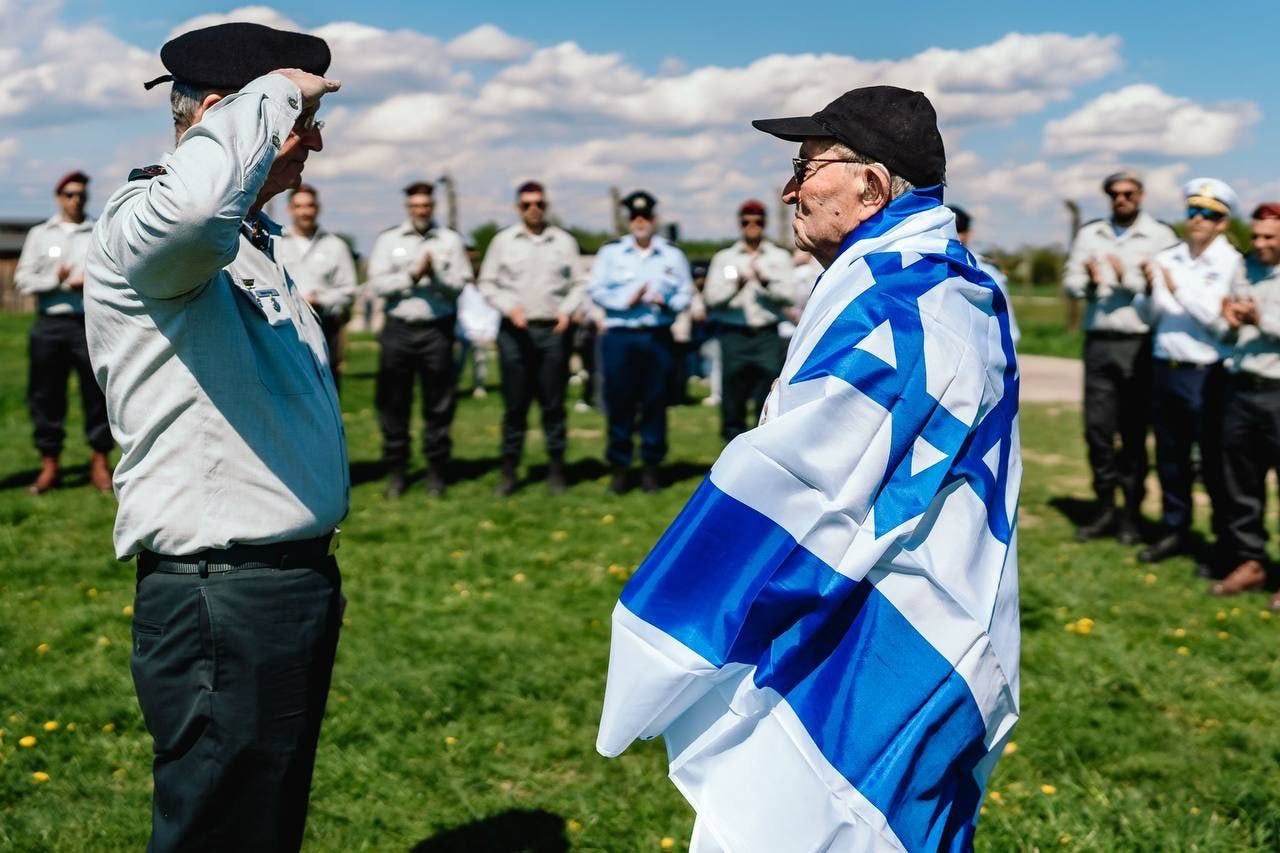The greatest memorial to the Holocaust is not a museum. It’s Israel.
Zionism is the Jewish People’s greatest response to the six million Jews systematically murdered and countless more traumatized by the Shoah.
Please consider supporting our mission to help everyone better understand and become smarter about the Jewish world. A gift of any amount helps keep our platform free of advertising and accessible to all.
You can also listen to the podcast version of this essay on Apple Podcasts, YouTube Music, YouTube, and Spotify.
Time is running out.
According to a report released this week by the Conference on Jewish Material Claims Against Germany, only an estimated 211,300 Holocaust survivors remain alive today. In just seven years, nearly half will be gone.
The window to hear their voices, hold their hands, and look into their eyes is rapidly closing. Soon, Holocaust memory will pass fully into the realm of history. But our duty to honor the victims — both those who perished and those who lived on — does not expire with their lifetimes.
To truly honor the victims of the Holocaust — which we are doing Wednesday evening and Thursday in Israel as part of Yom HaShoah (“The Holocaust Day” in Hebrew) — remembrance is not enough. Sympathy is not enough. Not even education is enough.
The greatest act of remembrance we can offer, the one that responds not only to their suffering but to the historic condition that made that suffering possible, is to embrace the things that could have changed everything: Jewish power, Jewish peoplehood, Jewish self-determination, Zionism.
Yes, Zionism. Not the slur, not the slander, not the caricature that too many in the world have come to accept, but Zionism in its truest form: the belief that the Jewish People, like any other people, have the right to govern themselves in their ancestral homeland.
The Holocaust was not merely a crime of unimaginable cruelty. It was a crime made possible by Jewish statelessness. By Jewish powerlessness. By the condition in which Jews were scattered, unprotected, and dependent on the mercy of others — a mercy that failed them in gas chambers, forests, ghettos, and death pits.
Never again is not a prayer, a sermon, a bumper sticker, or a hashtag. It is an unrelenting policy. And that policy is the modern State of Israel.
For Jews, Israel is not merely another country; it is the answer. It is the greatest decolonization project the world has ever seen: an indigenous people — exiled, dispersed, and persecuted for millennia — returning home and reclaiming sovereignty. While much of the Western world wrings its hands about indigenous rights, Israel is the living and breathing embodiment of them. While activists chant about liberation, the modern-day Israelites have emphatically achieved it.

We honor Holocaust victims not by fracturing Jewish identity into denominations and divisions, but by affirming Jewish peoplehood. Nazi Germany and its collaborators and sympathizers did not ask whether their victims lit Shabbat candles or believed in God. They were murdered as Jews. And so we must live as Jews — united in identity, collective in destiny, sovereign in our homeland.
The obsession with denominational labels — Reform, Conservative, Reconstructionist, Renewal, Orthodox-lite, traditional-but-not-religious — is, in this context, a kind of historical pettiness. It is the spiritual luxury of safety.
When Jewish life is secure, we debate over liturgy and halacha. But when Jewish life is threatened, none of that matters. In Auschwitz, there were no separate prayer groups. In the Warsaw Ghetto, no one checked which rabbinic seminary you aligned with before you were herded into cattle cars. The ghettos, the pits, the gas chambers — they collapsed the illusion of division. The world saw one category: Jew.
And we must reclaim that same clarity.
Not because religious and spiritual practice do not matter. (They do.) Not because belief doesn’t matter. But because peoplehood matters just as much, if not more.
Come to think of it, peoplehood precedes everything else. A Jew who doesn’t go to synagogue is still part of Am Yisrael. A Jew who doesn’t fast on Yom Kippur still carries the name the world will not let them forget. And a Jew in Tel Aviv, even if he’s never stepped foot in a yeshiva, is more vital to Jewish continuity than a committee of rabbis arguing over ritual minutiae in Manhattan.
There is no Reform Israel. No Conservative Israel. No Orthodox Israel. There is only Medinat Yisrael — the sovereign State of the Jewish People. And it exists not because of theological consensus, but because of historical necessity. It is the answer to Hitler. The answer to pogroms. The answer to exile.
And the same is true for politics. We will not save the Jewish future by pretending we all vote the same way, or should. Within Israel and across the Diaspora, Jews span the full political spectrum. There are Jewish progressives and Jewish conservatives. Jews who wave pride flags and Jews who wear black hats. Jews who march for climate action and Jews who defend the outposts of Judea and Samaria. This is not a weakness. It is a reflection of the fact that we are a people, not a party.
To demand political uniformity in the name of Jewish identity is to misunderstand Jewish identity altogether. The Jewish world has never been a monoculture. We’ve always argued. We’ve always disagreed. The Talmud itself is a book of disagreements. But what has kept us alive is the deeper truth beneath the debate: that, despite all our divisions, we are one people. Am echad b’lev echad.
We do not need to dilute our politics to stand together. We simply need to remember that our shared survival, and the memory of those who didn’t survive, matters more than any political disagreement.
So yes, argue about judicial reform. Argue about settlements. Argue about Diaspora-Israel relations. Argue about Netanyahu. But do it from within the family. Do it without walking away from the table. Do it with the humility of those who know that had we been alive in 1939, the world would not have cared which party we voted for.
To truly honor the victims of the Holocaust, we must transcend our narrow definitions of tribe, sect, and party. We must live the lesson their deaths taught: that what unites us must matter more than what divides us.
If we can do that — if we can affirm peoplehood over politics, nationhood over nuance — we will not just remember the victims. We will redeem them.
If we honor the Holocaust’s victims by turning our identity into a buffet line of personalized Judaism and Zionism, where everyone picks and chooses and calls it authenticity, we dishonor the unity that history has already imposed upon us. The correct response to six million murdered is not more labels. It is fewer. It is Jewish.
To build a future worthy of those who were lost, we must stop squabbling over who is “Jewish enough” or whose Judaism is “more authentic.” We need less branding and more belonging. Less bickering and more building. The stakes are too high, the memory too sacred, the responsibility too great.
Jewish peoplehood is not an option. It is an obligation. A gift paid for in blood. And if we forget that, if we prioritize our tribal squabbles over our tribal survival, we will have failed the victims of the Holocaust not only in memory, but in meaning.
To honor them, we must not apologize for surviving as well. We must not shrink ourselves to please a world that watched us burn. We must not outsource our safety, our culture, or our existence to the goodwill of nations who have too often shown neither good will nor memory.
We must raise children who speak Hebrew, know their history, believe that Jewish safety is not negotiable, learn that unshakeable Jewish pride is the only answer to antisemitism in all its forms, and understand that — as famed Holocaust survivor Elie Wiesel so pointedly said — “one can’t be Jewish without Israel.”
We must defend and support Israeli soldiers against the misconstrued labels of “oppressors” and “colonizers,” for they are guardians of Jewish continuity. We must tell the truth about our past so that we can secure our future. Not only for ourselves, but for the victims who never had the chance.

And, above all, to honor the victims of the Holocaust, we must never apologize for Israel, or for Zionism. Not now. Not ever. Not in times of peace, and not in times of war. Not when rockets are flying, and not when the streets are quiet. Not when the world is watching, and not when it pretends not to see.
Zionism is not a crime to be confessed. It is a justice long delayed and finally delivered. It is not colonialism; it is the undoing of colonialism. It is not extremism; it is the simple insistence that Jews deserve what every other people take for granted: a home, an army, a flag, a future.
The Jewish People does not owe the world an explanation for existing. We do not owe footnotes to social media mobs. We do not owe historical disclaimers to campus radicals. We do not need to earn our homeland with perfect behavior, or negotiate our sovereignty on the condition of global approval.
The legitimacy of Israel was not handed to us by the United Nations. It was earned by exile, by struggle, by blood, and by return.
Holocaust memory without Jewish strength is just tragedy tourism. If the world insists on remembering dead Jews while criticizing living ones for defending themselves, it is not remembrance at all; it is moral perversion.
The lesson of the Holocaust was not “be nicer to minorities.” It was: Never let anyone else be in charge of your survival, at any cost.
So when they tell us to renounce Zionism to be welcomed, we must decline. When they demand we condemn Israel to be included, we must refuse. When they insist that Jewish identity can be embraced only if Jewish power is rejected, we must stand taller.
Because the only thing more dangerous than Jewish power is Jewish powerlessness.
And if we are to honor the memory of six million murdered for lacking a nation, then our job is not to be apologetic inheritors of that memory, but unapologetic guardians of its lessons. We do not bow our heads in shame for having a state. We lift our heads in pride for having survived long enough to build one.
Zionism is not our embarrassment. It is our revenge — against those who tried to erase us, and failed. Against a world that shut its doors, and now must knock on ours. Against the silence of 1942, answered by the sirens of 1948.
The greatest memorial to the Holocaust is not a plaque. It is a passport. An Israeli one. Held by a Jewish child, born in a Jewish land, under a Jewish sky, who will never know what it means to be stateless. That is how we honor the victims: not with apologies, but with permanence.
There will come a day when the last Holocaust survivor exhales their final breath. On that day, a sacred baton will be passed entirely to us. Let us not be passive mourners. Let us be builders. Let us be defenders. Let us be unapologetic Jews and Zionists.
Because the best way to honor those who died stateless is to live — proudly, powerfully, and permanently — as a nation restored.



May this succinct memorial in text reach across our spectrum of Am Yisrael (The Jewish People) and throughout The Nations.
Zionism—that is, the movement and dream of the Hebrew people scattered far and wide, to return to their families still living in Israel, their ancestral homeland—wasn’t a response to the holocaust. It was a response to decades of murderous progroms in Europe (including the holocaust) that targeted the Hebrew people, which accelerated and focused the movement. Jews moving back home to Israel from abroad was a movement that began in the 1800s.